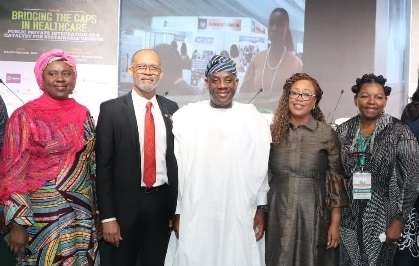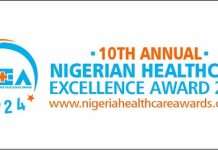
The Minister of State for Health and Social Welfare, Dr Tunji Alausa, has cautioned healthcare practitioners in Nigeria to desist from spreading a negative notion about the provision of healthcare services in the country, stating that the cost of operating healthcare business in Nigeria is not extremely high in comparison to what obtains overseas.
Acknowledging the challenges of multiple taxation and brain drain notwithstanding, he said provision of healthcare services basically require personnel, which operators have in abundance in the country, in addition to other requirements; adding that the Federal Government is working out a sustainable public-private partnership to make healthcare accessible to all Nigerians.
Dr Alausa, made this remark at the 2024 Annual Conference and Annual General Meeting of the Healthcare Federation of Nigeria (HFN), held at the Harbour Point, Victoria Island, Lagos, recently.
He assured practitioners of government efforts in resolving bottlenecks in the pathway of care provision, while ensuring that Nigerians have access to quality healthcare which is their right.
“We have a perception but let me do a different messaging here. Let’s be careful in arousing negative feelings in people regarding healthcare, let’s be realistic, cost of doing business in healthcare sector is not terribly high.
“Healthcare globally uses a highest chunk of personnel. If you have a healthcare business, 50 per cent of your operating cost should go for personnel. Now go to the UK and compare Nigeria’s situation with it, they have well trained personnel there, but we have energetic personnel who are not as trained like those in UK. For that reason, you can use 5 to10 per cent for your personnel, and save 40 per cent. From the 40 per cent left, you spend 10 per cent on energy generation, then 10 per cent on security, you will still have a margin between 20 to 25 per cent. So cost of doing healthcare business is not excessively high in Nigeria.
“I know you talk of multiple taxation, which has been reported to the president. That is why the president has set up a task committee to address this in a wholesome manner, so that multiple taxation will be eliminated. We have created a decent environment for businesses to thrive in the economy, and president is working towards improving workers welfare package”, he explained.
The Lagos State Commissioner for Health, also at the conference emphasised the major role of private sector in healthcare delivery in the state, saying the sector provides over 3000 healthcare facilities in comparison to a limited number of about 300 public hospitals in Lagos, for a population of 30 million.
With private sector's predominance in healthcare, he noted that the government is compelled by all indices to expedite an effective public- private partnership in the state, in line with the theme of the conference which is “Bridging the gaps in healthcare: public-private partnerships or integration as a catalyst for sustainable growth”.
He said “Lagos is serving a population of about 28 to 30 million people. We have 300 public health facilities, including general hospitals, private-public health facilities, and some specialist facilities, federal and tertiary academic centres. But in addition, we have over 3000 private healthcare facilities in Lagos.
“So when you look at the maths, there is a 10 to one ratio between private and public. This also tells us therefore that the private sector is really predominantly responsible for providing healthcare in Lagos state”.
Addressing the prominent participants at the conference, which cuts across the healthcare team, doctors, pharmacists, nurses, lab scientists, technicians among others, the President, Healthcare Federation of Nigeria (HFC) Dr Pamela Ajayi, highlighted the challenges encountered by members in their quest for healthcare provision, which informed the thematic discussion of the conference, as a means of developing workable solutions to the issues.
She particularly harped on the need to resolve most gaps in public-private partnership, irrespective of the significant interventions by the association, she maintained that there are still gaps to be bridged, in order for an average Nigerian to access healthcare seamlessly.
According to her, “Our mission is to support the achievement of up Universal Health Coverage, through private sector activation. And with the challenges that we experience in the country, with our healthcare institutions, etc. We know there are gaps in healthcare, and so we came up with this theme, because we know that there is a rift between the public and the private sectors although as friends, we have made a concerted effort to ensure that we work together.
“There are so many issues we've worked together on public private partnerships we have helped cultivate. There are so many things in the government we've advocated for that have been done, but still the gaps that exist, the rifts that exist between the two need to be closed for a lot of the healthcare system issues to be resolved’.
She disclosed that their major advocacy is moving beyond public-private partnerships to public-private integration and creating a seamless healthcare system that works for the benefit of all.














Ohhh, due to trained personnel